Module 2 Education.Unit 3 Language in use.课件
文档属性
| 名称 | Module 2 Education.Unit 3 Language in use.课件 | 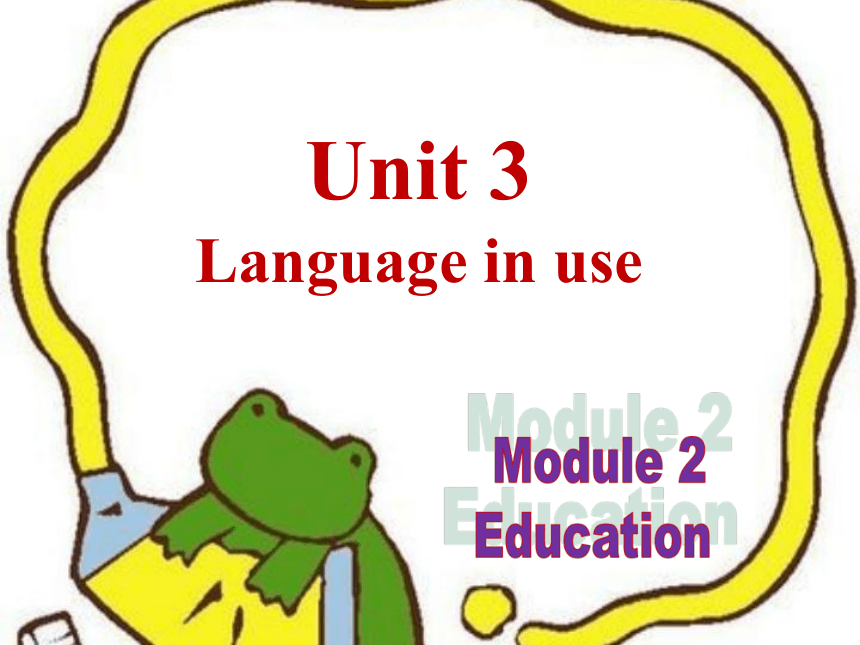 | |
| 格式 | zip | ||
| 文件大小 | 721.9KB | ||
| 资源类型 | 教案 | ||
| 版本资源 | 外研版 | ||
| 科目 | 英语 | ||
| 更新时间 | 2018-06-28 11:27:50 | ||
图片预览



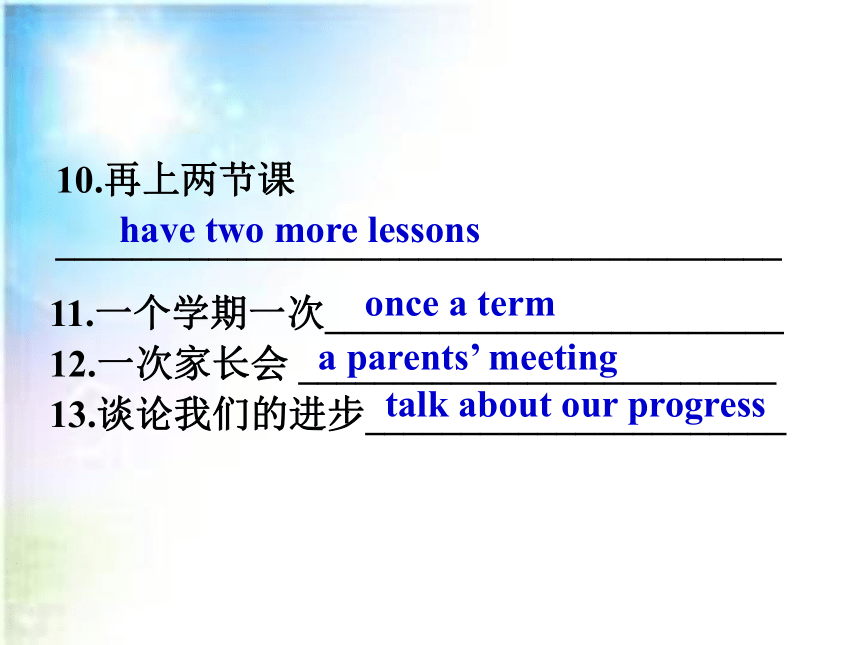
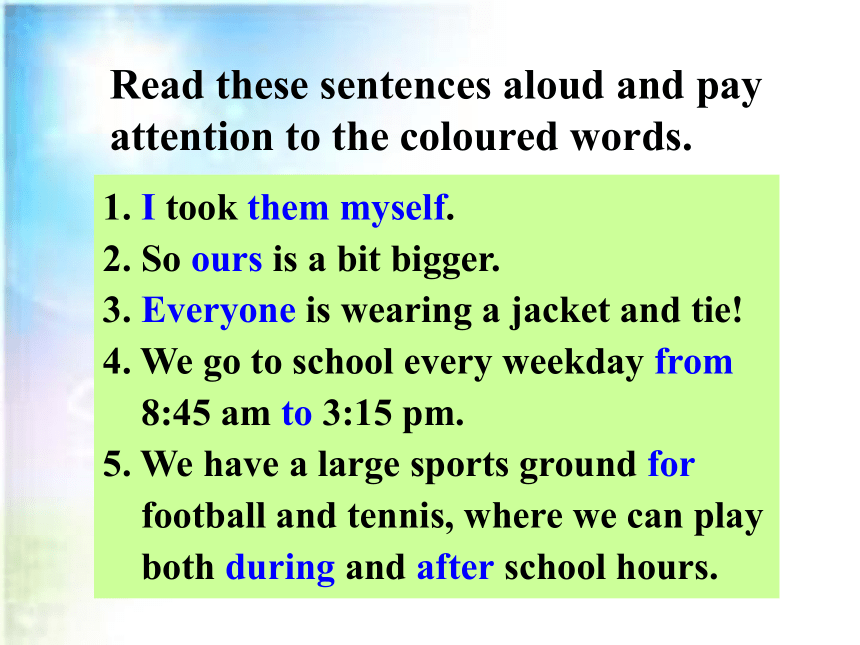
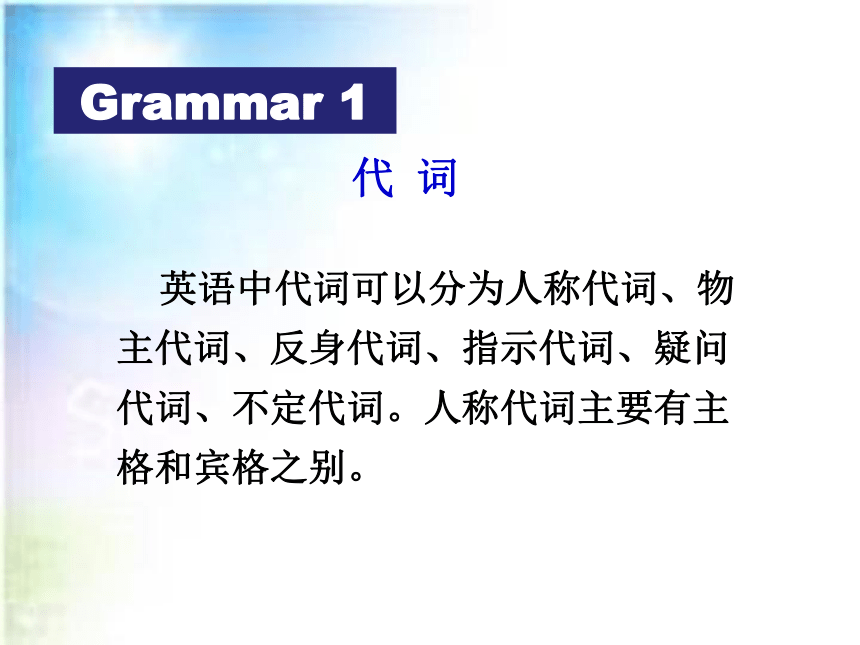
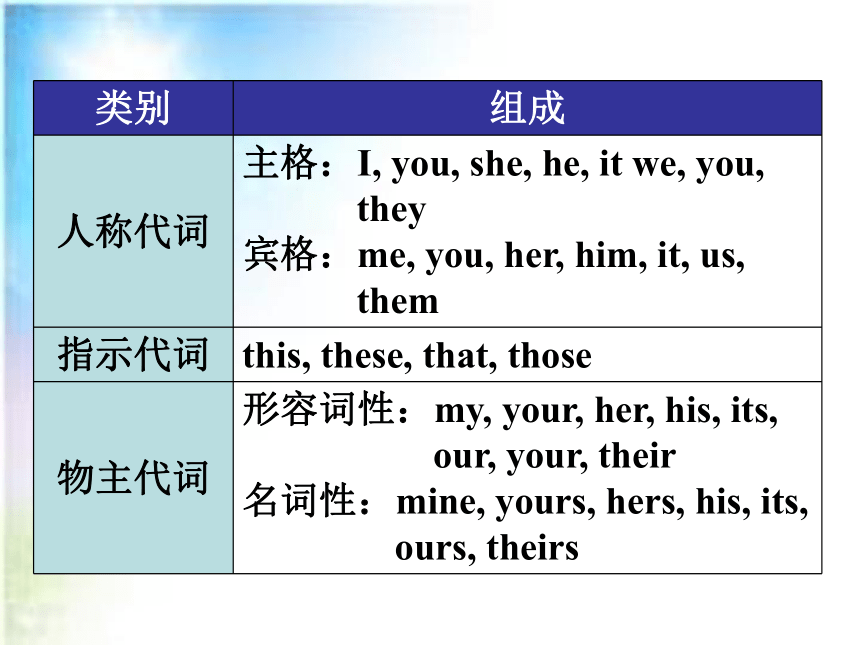
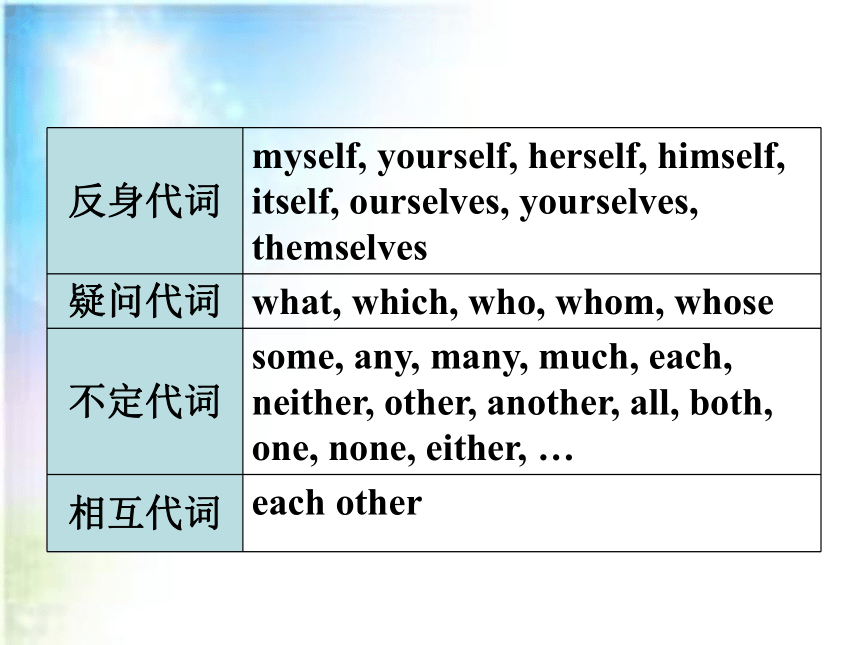
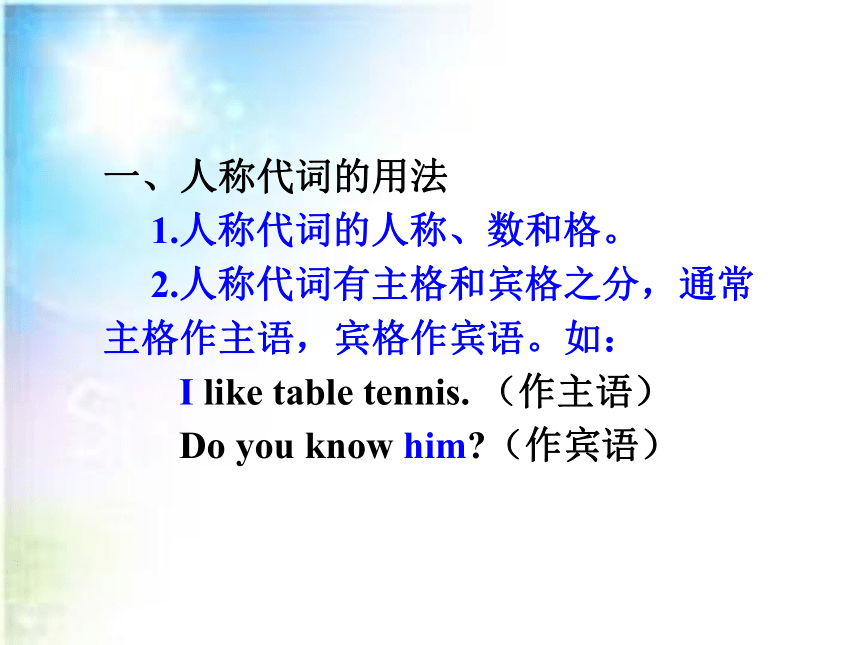


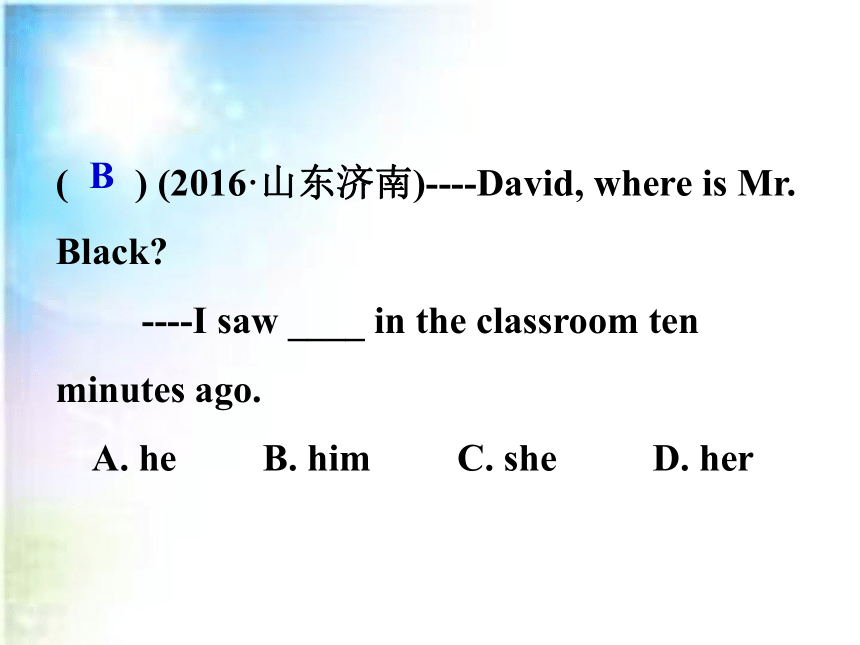
文档简介
课件95张PPT。Unit 3
Language in useModule 2
Education 1.I___________ (be) at school since I was 7. 2.明年通过考试 ________________________ 3.从我家骑自行车大约20分钟的一所中学_______________________________________ _______________________________________ 4.每个工作日_________________ 5.到场或者是缺席 ______________________have beenpass the exams next yearA secondary school about 20 minutes
away from my home by bike.present or absentevery weekdayRevision 6.去大礼堂/大厅 _________________go to the main hall7.告诉我们关于学校的消息
_________________________________
8.持续一个小时 ___________________
9.从11:05休息到11:15
__________________________________tell us news about the schoollast for an hourhave a break from 11:05 until 11:1510.再上两节课
______________________________________ have two more lessons11.一个学期一次________________________
12.一次家长会 _________________________
13.谈论我们的进步______________________once a terma parents’ meetingtalk about our progressRead these sentences aloud and pay attention to the coloured words.1. I took them myself.
2. So ours is a bit bigger.
3. Everyone is wearing a jacket and tie!
4. We go to school every weekday from
8:45 am to 3:15 pm.
5. We have a large sports ground for
football and tennis, where we can play
both during and after school hours.Grammar 1英语中代词可以分为人称代词、物主代词、反身代词、指示代词、疑问代词、不定代词。人称代词主要有主格和宾格之别。代 词一、人称代词的用法
1.人称代词的人称、数和格。
2.人称代词有主格和宾格之分,通常主格作主语,宾格作宾语。如:
I like table tennis. (作主语)
Do you know him?(作宾语)3.人称代词还可作表语,作表语时用宾格。如:
--- Who is knocking at the door?
--- It’s me.
4.人称代词在than之后与其他人或事物进行比较时,用主格和宾格都可以。如:
He is older than me.
He is older than I am.?(2017重庆)We Chinese people are proud of _______ country. ?? A. we???????? B. us???????? C. our??????? D. ours
【解析】考查代词用法。根据country应该是一个修饰词,那只能是形容词物主代词才能修饰名词,而A作主语,B作宾语,D单独使用,故答案是C。C( ) (2016·山东济南)----David, where is Mr. Black?
----I saw ____ in the classroom ten minutes ago.
A. he B. him C. she D. her B( ) Mrs. Smith often goes to visit those AIDS patients in hospitals to cheer _____ up. (2015苏州)
A. her B. them
C. him D. usB二. 物主代词的用法
1.表示所有关系的代词叫物主代词。物主代词分形容词性物主代词和名词性物主代词。
2. 形容词性物主代词的作用相当于形容词,可在句中作定语。例如:
Our teacher is coming to see us.
This is her pencil-box.3. 名词性物主代词的作用相当于名词,在句中可用作主语、宾语和表语。
Our school is here, and theirs is there.(作主语)
--- Is this English-book yours? (作表语)
--- No. Mine is in my bag.
I've already finished my homework. Have you finished yours? (作宾语)( )(2016·山东东营) How do you get on with _____ little brother? I’ve just had a baby sister I’m worrying about it.
A.my B.his
C.her D.yourD( )(2016·辽宁丹东)----I want to call my mother. But I can’t find my mobile phone.
----Don’t worry. My sister’s phone is here. You can use _____.
A. my B. mine
C. hers D. herC三. 反身代词的用法 (2017 南充)?-Your uncle is very good at cooking! How did he learn it? -He learned it by _______ .
A. him??????? B. himself?????
C. her???? D. herselfB( )(2016·山东东营)If we just think about _____, the boat of friendship will be overturned anytime.
A. myself B. himself
C. yourself D. ourselvesD( )(2016·四川雅安) Be careful with the knife. You may hurt ______.
A. himself B. ourselves
C. myself D. yourselfD四、不定代词的用法
不是指明代替任何特定名词的代词叫做不定代词,不定代词有:some, any, many, much, each, neither, other, another, all, both, one, none, either…在句中可作主语、表语、宾语和定语。现将几个常用的不定代词举例说明如下:1. some与any
any和some都表示“一些”。any多用于疑问句或否定句中,some多用于肯定句中。
--- How many people can you see in the picture?
--- I can’t see any.
If you have no money, I’l lend you some.注意:
1) 不定代词any用在肯定句中时,意思是“任何的”。如:
? You may come at any time.
2) 如果说话人希望得到肯定的回答,这时疑问句中可用some。
Would you like some sweets?( ) There isn’t ______ paper in the box.
Will you go and get ______ for me?
A. any; some
B. any; any
C. some; any A( ) If you have ________ question, come to me.
A. a B. an C. any D. some C( )(2016·四川南充)---I have two soccer balls. What about you?
----Oh, I don’t have _____.
A. some B. no
C. any D. muchC链接中考( )(2016·内蒙呼和浩特)---There is no salt left. Jim, would you like to get _____?
----OK, mum.
A. it B. one
C. some D. anyC2. few, a few, little, a little
1) a few(少数几个, 可数), few(很少几个, 可数):a few表示肯定,意思是虽少但有一些”;few表示否定,意思是不多、没有多少”。两者均可用作主语、宾语、定语等。
? Few of them know Spanish.(主语)
? A few of them know French.(主语)
? We know few of them.(宾语)
? He made very few mistakes in the exercise.2) a little (一些,不可数), little (很少,不可数):a little表示肯定;little表示否定。两者的差别和a few与few的差别相似。在句中可用作主语、宾语、定语等。
? He says little but does much.(宾语)
? I know a little about the play.(宾语)
? They went on with their work after a little rest.(定语)( ) --- Mr Wang, would you please tell me the result of the test?
--- You’ve done a good job. You made ______ mistakes.
?????A. a few?????B. few?????C. a little????? D. littleB( ) Simon makes _______ friends in his class because he is very selfish.
????? A. few??????B. a few???? C. little????? D. a littleA1.?There are a lot of new books, but ______
of them are easy to read.
2.?Do you want water? There is ________
left in my glass.
3.?Don't worry. We still have ________ time
left.
4.?There are_________ books left. We can't
lend you any one. 选用few, a few, little, a little填空:few a littlefewa little( )(2016·四川宜宾) This passage is very difficult. _____ people can understand it.
A. A few B. Few C. A littleB( )(2016·江苏淮安)There is ______ juice in the fridge. Let’s go and buy some.
A. few B. a few
C. little D. a littleC( ) Hurry up, kids! The school bus is coming. We have _____ time left.(2015广州)
A. few B. a few
C. little D. a littleC3. either与each
either 指两者中任一个, each 指两个或两个以上的每个
She drove away before?either?of them could speak again.?
I have bought two books, you can have?
either.
I asked all the children and?each?told a different story.
Each?of us has a company car.4. all和both
both指两个人或物,而all指三个以上的人或物,在句中都可作主语、宾语、表语、同位语或定语。?
All are present today.
There were two dogs in the garden. Both were fast asleep.
--- Who can speak Japanese?
--- We both (all) can.5. neither和none
neither指“两者之间任意一个都不...”,为完全否定。其做主语时,谓语动词一般只能用单数形式。
Neither of the twins looks beautiful.
none指“三者或以上之间任意一个都不...”,也是完全否定。其做主语时,谓语动词多用单数形式,但是也可用复数形式。
None of my classmates is / are taller than I / me. ( ) 1. Jiefangbei is not far from Chaotianmen. You can easily visit _____ in a day. (2015重庆A/C卷)
A. each B. none C. both D. neither( ) 2. -Mom, what would you like, coffee or tea? -_____. Just water, please. (2015温州)
A. Either B. both
C. Neither D. NoneCC( ) 3. My hometown is becoming more and more beautiful with trees and flowers on _____ sides of the road. (2015泰安)
A. all B. both C. neither D. either( ) 4. -Which of the two subjects do you like, art or music? -_____. They are really interesting. (2015益阳)
A. Neither B. Both C. NoneBB五、指示代词的用法
指示代词是表示指示概念的代词,即用来指示或标识人或事物的代词。
指示代词主要有下面四个: this (这)、these (这些)、that (那)、those (那些)
这四个词也可后接名词,变成该名词的限定词或定语,或称指示形容词,在句中可以用作主语、宾语、介词宾语、偶作表语。1. These are pens and ________ are pencils.
(that) 2. Tom was sick yesterday. _____ is why he
missed school. ( That,? Those, These) 3. Which of ______ shirts are Tom's? ( these,
this, that) 4. This desk is mine and ______ is hers.
( those, this, that) 5. The map of Beijing is better than _____ of
Tianjing. (this, that, these)用所给的词选择填空thoseThatthesethatthat( )(2016·湖北鄂州)----The population of China is larger than ______ of India.
---Yes, but India’s population is increasing rapidly.
A. it B. one C. that D. thisC六、疑问代词的用法
疑问代词是问何人、何物、何者的代词, 如: who (?谁,问人)、whose (谁的,问所有者),?whom (谁,问人,是who的宾格),?
which (哪一个),?what (什么,问东西)等。
疑问代词在句中起名词词组的作用,用来构成疑问句。--- Do you know _______ this dictionary
belongs to?
--- Let me see. Oh, it’s ________.
A. who does, mine B. who, me
C. whose, mine D. who, mine
解析:疑问词和代词的用法。句意为“—你知道这本词典是谁的吗?—我看看。哦,是我的” 。belong to 后面 应该加“某人” ,而不是加“物主代词” ;所以第一个空用 who;名词性物主代词 mine 想当于 my dictionary。D( ) The dog _____ played with you just now is _____.
A. which; mine
B. which; my
C. what; mine
D. what; myAThese are ___ books. Yours are over there.
A. I B. my C. me D. mine
[析]这里应用形容词性物主代词,在名词books前面作定语。Mary, help ___to the bananas, please.
A. you B. your
C. yourself D. yourselves
[析]help oneself to something意思是“随便吃…,自用(食物等)”,是招待客人的常用语。yourself为“你一个人”,而yourselves为“你们”。Mr. Smith is an old friend of___.
A. I B. me C. my D. mine
[析]这里应选名词性物主代词,这是英语的一种习惯用法,而不要选择my。---“Mum, Ann’s coming tonight. Let’s give her ___ to eat.”
---“Good idea!”
A. anything nice B. nice anything
C. something nice D. nice something
[析]肯定句中用something而不用anything, 不定代词的修饰词应放其后而不要放在其前面。 This is not her kite, but___.
A. he's B. him C. he D. his
[析]要注意“他的”名词性物主代词与形容词性物主代词是同形的。The teacher gave ___ student a new book.
A. nobody B. both C. each D. any
[析]both其后的名词应为复数,而any用于疑问句和否定句中,只有each可以修饰单数可数名词。 ________ of them has his own opinion.
A. Both B. Some
C. Every D. Each
[析]该题考查的是不定代词用法。因为谓语动词是单数形式,所以both和some都不对。every不能单独作主语或宾语。只有each合适。--- Where is my pen?
--- Oh, sorry. I have taken _______ by mistake.
A. yours B. his C. mine D. hers
[析]该题考查的是物主代词的用法。根据题干,我们可以判断出错拿的钢笔应该是对方的,所以选yours。( )Jackie Chan won an Oscar after______56-year-long career in the film industry. (2017 盐城)
A. he?B. his?C. him?D. himself链接中考B( ) (2016?滨州)---Don’t be angry with your kid when he makes a mistake again, will you?
---No, I won’t. I know that ________ of us are perfect after all.
A.none B.neither
C.each D.allA( ) (2016?重庆)I’m sorry I know ______ about it.It’s a secret between them.
A.nothing B.something
C.anything D.Everything
( )(2016?广东)---I’m a little hungry, Daddy.
---See the cupcakes on the plate, but you can only take ______, dinner is ready soon.
A.it B.one C.this D.thatAB( ) (2016?长沙)---What are you doing, Tim?
---I am listening to the song Long Live _______ makes me feel excited.
A.which B.who C./A( ) I don’t like _____ watch. I like _____.(2015天津)
A. me; your B. my; your
C. me; yours D. my; yoursD( ) -Rose, could you please water the flowers in the garden? -Why _____? You see, my brother is listening to music. (2015长沙)
A. me B.I C. mineA( ) The man over there is _____ old friend. He is a policeman. (2015重庆B卷)
A. I B. me C. my D. mine( ) My mother used to make breakfast for _____ every morning, but now I do it myself. (2015重庆A/C卷)
A. mine B. my C. I D. meCD( ) Uncle Tom will come to visit _____ next Saturday. (2015济宁)
A. we B. us C. our D. ours( ) Miss Yang is a kind teacher. All the students love _____.(2015三亚)
A. she B. her C. hersBB( ) ______of us wants to go to the park today, because we have to finish so much homework. ???????A. Either ???B. Both ???C. NeitherC( ) I have a big brother. _______ name is Paul. A. His????? B. Her????? C. He??????? D. YourA经典例题( ) —Which of the two subjects do you like, art or music?
—______. They are really interesting
A. Neither B. Both C. None D. AllB( ) —Hi, guys. How was your party yesterday?
—Wonderful! We had a big meal and enjoyed _______.
A. themselves B. myself
C. yourselves D. ourselvesD介词是一种用来表示词与词、词与句之间的关系的词,在句中不能单独作句子成分。
介词后面一般有名词、代词或相当于名词的其他词类,短语或从句作它的宾语。介 词Grammar 21)at, in on 表示时间点用at, 例如:at six o’clock, at noon, at midnight。
表示在某个世纪、某年、某月、某个季节 以及早晨、上午、下午、晚上时,用in。常用介词辨析(1)表时间的介词例如:in the nineteenth century, in 2002,
in may, in winter, in the morning, in the afternoon
表示具体的某一天和某一天的上午、下午、晚上时,用on。 例如:
on Monday, on July 1st, on Sunday morning1. Mary is flying to France soon. She will arrive in Paris _______ the morning of July 9.
A. on B. in C. at
2. The twins were born _______ a Friday evening.
A. in B. on C. at3. We travelled overnight to Paris and arrived _____ 5 o’clock _____ the morning.
A. on, in B. at, in C. at, on
4. We finish our lessons ______ 11:30 and then have a rest ______ noon.
A. in, in B. at, at C. in, at
由since和after 引导的词组都可表示从过去某一点开始的时段,但since词组表示的时段一直延续到说话的时刻,因而往往要与现在完成时连用,而after词组所表示的时段纯系过去,因而要与一般过去时连用。2)?since, after例如:
I haven’t heard from him since last summer.
自从去年夏天,我再也没有收到他的信。
After five days the boy came back.
五天后,这男孩返回来。in与将来时态连用时,表示“过多长时间以后”的意思,后面跟表示一段时间的词语。
after与将来时态连用时,后面只能跟表示时间点的词语。after与过去时态连用时,后面才能跟表示一段时间的词语。3)?in, after例如:
He will be back in two months.
他在两个月后回来。
He will arrive after four o’clock.
四点钟后,他到达。
He returned after a month.
一个月后,他回来了。1. Mr. Brown has gone to Canada. He will be back ______ two weeks.
A. for B. after C. in
2. Our manager came back _____ an hour.
A. in B. after C. at
3. They have been here ______ an hour.
A. for B. after C. in
for +一段时间,表示动作延续了一段时间at, in, on
at一般指小地方;
in一般指大地方或某个范围之内;
on往往表示“在某个物体的表面”。(2)表示地点方位的介词He arrived in Shanghai yesterday.
他昨他天到达上海。
They arrived at a small village before dark.
他们在天黑前到达一个小村庄。
There is a big hole in the wall.
墙上有一个大洞。
The teacher put up a picture on the wall.
老师把一幅画挂在墙上。over, on和above都可表示“在……上面”,但具体含义不同。
over表示位置高于某物,在某物的正上方,其反义词是under。
above也表示位置高于某物,但不一定在正上方,其反义词是below。
on指两个物体表面接触,一个在另一的上面。over, above, on例如:
There is a bridge over the river.
河上有一架桥。
We flew above the clouds.
我们飞越云层。
They put some flowers on the teacher’s desk.
他们把一些花放在讲桌上。ondownunderupbelowoverabovebeneathin on to 1. China lies ______ the east of Asia and ______ the north of Australia.
A. in, on B. in, to C. to, in
2.Mongolia (蒙古) is ______ the north of China.
A. in B. on C. to
介词往往同其他词类形成固定搭配关系。记住这种固定搭配关系,才能正确使用介词。
(1)介词与动词的搭配
listen to, laugh at, get to, look for, wait for, hear from, turn on, turn off, worry about, think of, look after, belong to, …等。介词的固定搭配(2)介词与名词的搭配
on time, in time, by bus, on foot, with pleasure, on one’s way (to), in trouble, at breakfast, at the end of, in the end等。
(3)介词与形容词的搭配
be late for, be afraid of, be good at, be interested in, be angry with, be full of, be sorry for等。 --- When did Hong Kong return to our motherland? --- ____July 1st, 1997. A. On??? ???B. In??? ????C. At??? ????D. For 本题的四个选项都可以放在表示时间的单词(组)前面,in,on,at往往在时间点的前面,for往往引导一个时间段。1997年7月1日是一个具体的时间,在具体到某一天时用介词on。I’d like a cup of coffee _______ some sugar and milk. A. in??????????? ??B. to??????????? ??
C. of??????????? ??D. within表示“在……里面”;to表方向,意为“到,向”;of表“所属关系”,意为“……的”;with作“带有”等讲。由句意“我想要一杯加糖和牛奶的咖啡。”可知,选项D正确。-- Oh, so many people in the amusement park! -- Nobody likes to stay at home _______ Sunday morning. A. in????????? B. on?????????? C. at此题考查介词的用法。三个选择都可以用来表示时间,at多用于具体时间点前,在上、下午及晚上常用介词in,但具体到某一天的上、下午要用介词on。--- I hear you have got a ticket ______ the Opening Ceremony of the Beijing Olympics. --- Yes. I got it _______ my uncle.
A. of; from??? ??B. to; by??? ???
C. to; from??? ? ??D. for; to考查介词的用法。本题易错选项为A。
“……的答案/钥匙/票”,后面用介词to,而不能用of。故不能选A。It was a great day but we did not enjoy it ______ the beginning. A. on??? ? ??B. for? ????
C. with??? ? ??D. at此处考查固定短语“在……开始时”,用介词at,故选D。It is important _______ us students to make a plan _______ our studies before a new term starts. A. for; for??? ? ?B. of; for??? ??
C. to; of??? ?? D. with; on此题考查介词for的用法,第一空It is important for sb. to do sth. ;第二空for our studies为我们的学习,表目的。(2016?盐城)The 3-D film The Angry Birds opened in Chinese cinemas _______ May 20, 2016.
A. on B. at C. in D. to
(2016?株洲)Her birthday is ______ winter, the most beautiful season in a year.
A. in B. at C. on链接中考-A person’s life is like a road _____ lots of difficulties. -Yes. So we need positive energy. (2015三亚)
A. by B. with C. alongBen was helping his mother when the rain began to beat heavily _____ the windows. (2017杭州)
A. below B. across
C. behind D. against
In cold winter, the temperature in Harbin often remains _____ zero all day. (2017苏州)
A. above B. below
C. over D. under—Do you remember what she looked like when you first met her? —Of course. She was tall and thin _____ long hair.(2017福州)
A. in B. with C. on
-When is Lang Lang’s concert? -It’s _____ three o’clock _____ the afternoon of December 18th. (2016安顺)
A. at; in B. at; on
C. on; in D. in; on-Do you know about Florence Nightingale? -Yes, she was well-known _____ a nurse in England _____ her kindness to the sick and wounded soldiers. (2016克拉玛依)
A. as; as B. for; as
C. to; for D. as; for
The Dragon Boat Festival this year will come _____ four days. (2017安徽)
A. after B. for
C. during D. in-Could you tell me the way _____ the railway station? -Go along this road and soon you’ll find it. (2017天津)
A. at B. to C. in D. between
-The charity walk begins _____ 9:00. Don’t be late. -No problem. (2016武威)
A. at B. by C. in D. on
Language in useModule 2
Education 1.I___________ (be) at school since I was 7. 2.明年通过考试 ________________________ 3.从我家骑自行车大约20分钟的一所中学_______________________________________ _______________________________________ 4.每个工作日_________________ 5.到场或者是缺席 ______________________have beenpass the exams next yearA secondary school about 20 minutes
away from my home by bike.present or absentevery weekdayRevision 6.去大礼堂/大厅 _________________go to the main hall7.告诉我们关于学校的消息
_________________________________
8.持续一个小时 ___________________
9.从11:05休息到11:15
__________________________________tell us news about the schoollast for an hourhave a break from 11:05 until 11:1510.再上两节课
______________________________________ have two more lessons11.一个学期一次________________________
12.一次家长会 _________________________
13.谈论我们的进步______________________once a terma parents’ meetingtalk about our progressRead these sentences aloud and pay attention to the coloured words.1. I took them myself.
2. So ours is a bit bigger.
3. Everyone is wearing a jacket and tie!
4. We go to school every weekday from
8:45 am to 3:15 pm.
5. We have a large sports ground for
football and tennis, where we can play
both during and after school hours.Grammar 1英语中代词可以分为人称代词、物主代词、反身代词、指示代词、疑问代词、不定代词。人称代词主要有主格和宾格之别。代 词一、人称代词的用法
1.人称代词的人称、数和格。
2.人称代词有主格和宾格之分,通常主格作主语,宾格作宾语。如:
I like table tennis. (作主语)
Do you know him?(作宾语)3.人称代词还可作表语,作表语时用宾格。如:
--- Who is knocking at the door?
--- It’s me.
4.人称代词在than之后与其他人或事物进行比较时,用主格和宾格都可以。如:
He is older than me.
He is older than I am.?(2017重庆)We Chinese people are proud of _______ country. ?? A. we???????? B. us???????? C. our??????? D. ours
【解析】考查代词用法。根据country应该是一个修饰词,那只能是形容词物主代词才能修饰名词,而A作主语,B作宾语,D单独使用,故答案是C。C( ) (2016·山东济南)----David, where is Mr. Black?
----I saw ____ in the classroom ten minutes ago.
A. he B. him C. she D. her B( ) Mrs. Smith often goes to visit those AIDS patients in hospitals to cheer _____ up. (2015苏州)
A. her B. them
C. him D. usB二. 物主代词的用法
1.表示所有关系的代词叫物主代词。物主代词分形容词性物主代词和名词性物主代词。
2. 形容词性物主代词的作用相当于形容词,可在句中作定语。例如:
Our teacher is coming to see us.
This is her pencil-box.3. 名词性物主代词的作用相当于名词,在句中可用作主语、宾语和表语。
Our school is here, and theirs is there.(作主语)
--- Is this English-book yours? (作表语)
--- No. Mine is in my bag.
I've already finished my homework. Have you finished yours? (作宾语)( )(2016·山东东营) How do you get on with _____ little brother? I’ve just had a baby sister I’m worrying about it.
A.my B.his
C.her D.yourD( )(2016·辽宁丹东)----I want to call my mother. But I can’t find my mobile phone.
----Don’t worry. My sister’s phone is here. You can use _____.
A. my B. mine
C. hers D. herC三. 反身代词的用法 (2017 南充)?-Your uncle is very good at cooking! How did he learn it? -He learned it by _______ .
A. him??????? B. himself?????
C. her???? D. herselfB( )(2016·山东东营)If we just think about _____, the boat of friendship will be overturned anytime.
A. myself B. himself
C. yourself D. ourselvesD( )(2016·四川雅安) Be careful with the knife. You may hurt ______.
A. himself B. ourselves
C. myself D. yourselfD四、不定代词的用法
不是指明代替任何特定名词的代词叫做不定代词,不定代词有:some, any, many, much, each, neither, other, another, all, both, one, none, either…在句中可作主语、表语、宾语和定语。现将几个常用的不定代词举例说明如下:1. some与any
any和some都表示“一些”。any多用于疑问句或否定句中,some多用于肯定句中。
--- How many people can you see in the picture?
--- I can’t see any.
If you have no money, I’l lend you some.注意:
1) 不定代词any用在肯定句中时,意思是“任何的”。如:
? You may come at any time.
2) 如果说话人希望得到肯定的回答,这时疑问句中可用some。
Would you like some sweets?( ) There isn’t ______ paper in the box.
Will you go and get ______ for me?
A. any; some
B. any; any
C. some; any A( ) If you have ________ question, come to me.
A. a B. an C. any D. some C( )(2016·四川南充)---I have two soccer balls. What about you?
----Oh, I don’t have _____.
A. some B. no
C. any D. muchC链接中考( )(2016·内蒙呼和浩特)---There is no salt left. Jim, would you like to get _____?
----OK, mum.
A. it B. one
C. some D. anyC2. few, a few, little, a little
1) a few(少数几个, 可数), few(很少几个, 可数):a few表示肯定,意思是虽少但有一些”;few表示否定,意思是不多、没有多少”。两者均可用作主语、宾语、定语等。
? Few of them know Spanish.(主语)
? A few of them know French.(主语)
? We know few of them.(宾语)
? He made very few mistakes in the exercise.2) a little (一些,不可数), little (很少,不可数):a little表示肯定;little表示否定。两者的差别和a few与few的差别相似。在句中可用作主语、宾语、定语等。
? He says little but does much.(宾语)
? I know a little about the play.(宾语)
? They went on with their work after a little rest.(定语)( ) --- Mr Wang, would you please tell me the result of the test?
--- You’ve done a good job. You made ______ mistakes.
?????A. a few?????B. few?????C. a little????? D. littleB( ) Simon makes _______ friends in his class because he is very selfish.
????? A. few??????B. a few???? C. little????? D. a littleA1.?There are a lot of new books, but ______
of them are easy to read.
2.?Do you want water? There is ________
left in my glass.
3.?Don't worry. We still have ________ time
left.
4.?There are_________ books left. We can't
lend you any one. 选用few, a few, little, a little填空:few a littlefewa little( )(2016·四川宜宾) This passage is very difficult. _____ people can understand it.
A. A few B. Few C. A littleB( )(2016·江苏淮安)There is ______ juice in the fridge. Let’s go and buy some.
A. few B. a few
C. little D. a littleC( ) Hurry up, kids! The school bus is coming. We have _____ time left.(2015广州)
A. few B. a few
C. little D. a littleC3. either与each
either 指两者中任一个, each 指两个或两个以上的每个
She drove away before?either?of them could speak again.?
I have bought two books, you can have?
either.
I asked all the children and?each?told a different story.
Each?of us has a company car.4. all和both
both指两个人或物,而all指三个以上的人或物,在句中都可作主语、宾语、表语、同位语或定语。?
All are present today.
There were two dogs in the garden. Both were fast asleep.
--- Who can speak Japanese?
--- We both (all) can.5. neither和none
neither指“两者之间任意一个都不...”,为完全否定。其做主语时,谓语动词一般只能用单数形式。
Neither of the twins looks beautiful.
none指“三者或以上之间任意一个都不...”,也是完全否定。其做主语时,谓语动词多用单数形式,但是也可用复数形式。
None of my classmates is / are taller than I / me. ( ) 1. Jiefangbei is not far from Chaotianmen. You can easily visit _____ in a day. (2015重庆A/C卷)
A. each B. none C. both D. neither( ) 2. -Mom, what would you like, coffee or tea? -_____. Just water, please. (2015温州)
A. Either B. both
C. Neither D. NoneCC( ) 3. My hometown is becoming more and more beautiful with trees and flowers on _____ sides of the road. (2015泰安)
A. all B. both C. neither D. either( ) 4. -Which of the two subjects do you like, art or music? -_____. They are really interesting. (2015益阳)
A. Neither B. Both C. NoneBB五、指示代词的用法
指示代词是表示指示概念的代词,即用来指示或标识人或事物的代词。
指示代词主要有下面四个: this (这)、these (这些)、that (那)、those (那些)
这四个词也可后接名词,变成该名词的限定词或定语,或称指示形容词,在句中可以用作主语、宾语、介词宾语、偶作表语。1. These are pens and ________ are pencils.
(that) 2. Tom was sick yesterday. _____ is why he
missed school. ( That,? Those, These) 3. Which of ______ shirts are Tom's? ( these,
this, that) 4. This desk is mine and ______ is hers.
( those, this, that) 5. The map of Beijing is better than _____ of
Tianjing. (this, that, these)用所给的词选择填空thoseThatthesethatthat( )(2016·湖北鄂州)----The population of China is larger than ______ of India.
---Yes, but India’s population is increasing rapidly.
A. it B. one C. that D. thisC六、疑问代词的用法
疑问代词是问何人、何物、何者的代词, 如: who (?谁,问人)、whose (谁的,问所有者),?whom (谁,问人,是who的宾格),?
which (哪一个),?what (什么,问东西)等。
疑问代词在句中起名词词组的作用,用来构成疑问句。--- Do you know _______ this dictionary
belongs to?
--- Let me see. Oh, it’s ________.
A. who does, mine B. who, me
C. whose, mine D. who, mine
解析:疑问词和代词的用法。句意为“—你知道这本词典是谁的吗?—我看看。哦,是我的” 。belong to 后面 应该加“某人” ,而不是加“物主代词” ;所以第一个空用 who;名词性物主代词 mine 想当于 my dictionary。D( ) The dog _____ played with you just now is _____.
A. which; mine
B. which; my
C. what; mine
D. what; myAThese are ___ books. Yours are over there.
A. I B. my C. me D. mine
[析]这里应用形容词性物主代词,在名词books前面作定语。Mary, help ___to the bananas, please.
A. you B. your
C. yourself D. yourselves
[析]help oneself to something意思是“随便吃…,自用(食物等)”,是招待客人的常用语。yourself为“你一个人”,而yourselves为“你们”。Mr. Smith is an old friend of___.
A. I B. me C. my D. mine
[析]这里应选名词性物主代词,这是英语的一种习惯用法,而不要选择my。---“Mum, Ann’s coming tonight. Let’s give her ___ to eat.”
---“Good idea!”
A. anything nice B. nice anything
C. something nice D. nice something
[析]肯定句中用something而不用anything, 不定代词的修饰词应放其后而不要放在其前面。 This is not her kite, but___.
A. he's B. him C. he D. his
[析]要注意“他的”名词性物主代词与形容词性物主代词是同形的。The teacher gave ___ student a new book.
A. nobody B. both C. each D. any
[析]both其后的名词应为复数,而any用于疑问句和否定句中,只有each可以修饰单数可数名词。 ________ of them has his own opinion.
A. Both B. Some
C. Every D. Each
[析]该题考查的是不定代词用法。因为谓语动词是单数形式,所以both和some都不对。every不能单独作主语或宾语。只有each合适。--- Where is my pen?
--- Oh, sorry. I have taken _______ by mistake.
A. yours B. his C. mine D. hers
[析]该题考查的是物主代词的用法。根据题干,我们可以判断出错拿的钢笔应该是对方的,所以选yours。( )Jackie Chan won an Oscar after______56-year-long career in the film industry. (2017 盐城)
A. he?B. his?C. him?D. himself链接中考B( ) (2016?滨州)---Don’t be angry with your kid when he makes a mistake again, will you?
---No, I won’t. I know that ________ of us are perfect after all.
A.none B.neither
C.each D.allA( ) (2016?重庆)I’m sorry I know ______ about it.It’s a secret between them.
A.nothing B.something
C.anything D.Everything
( )(2016?广东)---I’m a little hungry, Daddy.
---See the cupcakes on the plate, but you can only take ______, dinner is ready soon.
A.it B.one C.this D.thatAB( ) (2016?长沙)---What are you doing, Tim?
---I am listening to the song Long Live _______ makes me feel excited.
A.which B.who C./A( ) I don’t like _____ watch. I like _____.(2015天津)
A. me; your B. my; your
C. me; yours D. my; yoursD( ) -Rose, could you please water the flowers in the garden? -Why _____? You see, my brother is listening to music. (2015长沙)
A. me B.I C. mineA( ) The man over there is _____ old friend. He is a policeman. (2015重庆B卷)
A. I B. me C. my D. mine( ) My mother used to make breakfast for _____ every morning, but now I do it myself. (2015重庆A/C卷)
A. mine B. my C. I D. meCD( ) Uncle Tom will come to visit _____ next Saturday. (2015济宁)
A. we B. us C. our D. ours( ) Miss Yang is a kind teacher. All the students love _____.(2015三亚)
A. she B. her C. hersBB( ) ______of us wants to go to the park today, because we have to finish so much homework. ???????A. Either ???B. Both ???C. NeitherC( ) I have a big brother. _______ name is Paul. A. His????? B. Her????? C. He??????? D. YourA经典例题( ) —Which of the two subjects do you like, art or music?
—______. They are really interesting
A. Neither B. Both C. None D. AllB( ) —Hi, guys. How was your party yesterday?
—Wonderful! We had a big meal and enjoyed _______.
A. themselves B. myself
C. yourselves D. ourselvesD介词是一种用来表示词与词、词与句之间的关系的词,在句中不能单独作句子成分。
介词后面一般有名词、代词或相当于名词的其他词类,短语或从句作它的宾语。介 词Grammar 21)at, in on 表示时间点用at, 例如:at six o’clock, at noon, at midnight。
表示在某个世纪、某年、某月、某个季节 以及早晨、上午、下午、晚上时,用in。常用介词辨析(1)表时间的介词例如:in the nineteenth century, in 2002,
in may, in winter, in the morning, in the afternoon
表示具体的某一天和某一天的上午、下午、晚上时,用on。 例如:
on Monday, on July 1st, on Sunday morning1. Mary is flying to France soon. She will arrive in Paris _______ the morning of July 9.
A. on B. in C. at
2. The twins were born _______ a Friday evening.
A. in B. on C. at3. We travelled overnight to Paris and arrived _____ 5 o’clock _____ the morning.
A. on, in B. at, in C. at, on
4. We finish our lessons ______ 11:30 and then have a rest ______ noon.
A. in, in B. at, at C. in, at
由since和after 引导的词组都可表示从过去某一点开始的时段,但since词组表示的时段一直延续到说话的时刻,因而往往要与现在完成时连用,而after词组所表示的时段纯系过去,因而要与一般过去时连用。2)?since, after例如:
I haven’t heard from him since last summer.
自从去年夏天,我再也没有收到他的信。
After five days the boy came back.
五天后,这男孩返回来。in与将来时态连用时,表示“过多长时间以后”的意思,后面跟表示一段时间的词语。
after与将来时态连用时,后面只能跟表示时间点的词语。after与过去时态连用时,后面才能跟表示一段时间的词语。3)?in, after例如:
He will be back in two months.
他在两个月后回来。
He will arrive after four o’clock.
四点钟后,他到达。
He returned after a month.
一个月后,他回来了。1. Mr. Brown has gone to Canada. He will be back ______ two weeks.
A. for B. after C. in
2. Our manager came back _____ an hour.
A. in B. after C. at
3. They have been here ______ an hour.
A. for B. after C. in
for +一段时间,表示动作延续了一段时间at, in, on
at一般指小地方;
in一般指大地方或某个范围之内;
on往往表示“在某个物体的表面”。(2)表示地点方位的介词He arrived in Shanghai yesterday.
他昨他天到达上海。
They arrived at a small village before dark.
他们在天黑前到达一个小村庄。
There is a big hole in the wall.
墙上有一个大洞。
The teacher put up a picture on the wall.
老师把一幅画挂在墙上。over, on和above都可表示“在……上面”,但具体含义不同。
over表示位置高于某物,在某物的正上方,其反义词是under。
above也表示位置高于某物,但不一定在正上方,其反义词是below。
on指两个物体表面接触,一个在另一的上面。over, above, on例如:
There is a bridge over the river.
河上有一架桥。
We flew above the clouds.
我们飞越云层。
They put some flowers on the teacher’s desk.
他们把一些花放在讲桌上。ondownunderupbelowoverabovebeneathin on to 1. China lies ______ the east of Asia and ______ the north of Australia.
A. in, on B. in, to C. to, in
2.Mongolia (蒙古) is ______ the north of China.
A. in B. on C. to
介词往往同其他词类形成固定搭配关系。记住这种固定搭配关系,才能正确使用介词。
(1)介词与动词的搭配
listen to, laugh at, get to, look for, wait for, hear from, turn on, turn off, worry about, think of, look after, belong to, …等。介词的固定搭配(2)介词与名词的搭配
on time, in time, by bus, on foot, with pleasure, on one’s way (to), in trouble, at breakfast, at the end of, in the end等。
(3)介词与形容词的搭配
be late for, be afraid of, be good at, be interested in, be angry with, be full of, be sorry for等。 --- When did Hong Kong return to our motherland? --- ____July 1st, 1997. A. On??? ???B. In??? ????C. At??? ????D. For 本题的四个选项都可以放在表示时间的单词(组)前面,in,on,at往往在时间点的前面,for往往引导一个时间段。1997年7月1日是一个具体的时间,在具体到某一天时用介词on。I’d like a cup of coffee _______ some sugar and milk. A. in??????????? ??B. to??????????? ??
C. of??????????? ??D. within表示“在……里面”;to表方向,意为“到,向”;of表“所属关系”,意为“……的”;with作“带有”等讲。由句意“我想要一杯加糖和牛奶的咖啡。”可知,选项D正确。-- Oh, so many people in the amusement park! -- Nobody likes to stay at home _______ Sunday morning. A. in????????? B. on?????????? C. at此题考查介词的用法。三个选择都可以用来表示时间,at多用于具体时间点前,在上、下午及晚上常用介词in,但具体到某一天的上、下午要用介词on。--- I hear you have got a ticket ______ the Opening Ceremony of the Beijing Olympics. --- Yes. I got it _______ my uncle.
A. of; from??? ??B. to; by??? ???
C. to; from??? ? ??D. for; to考查介词的用法。本题易错选项为A。
“……的答案/钥匙/票”,后面用介词to,而不能用of。故不能选A。It was a great day but we did not enjoy it ______ the beginning. A. on??? ? ??B. for? ????
C. with??? ? ??D. at此处考查固定短语“在……开始时”,用介词at,故选D。It is important _______ us students to make a plan _______ our studies before a new term starts. A. for; for??? ? ?B. of; for??? ??
C. to; of??? ?? D. with; on此题考查介词for的用法,第一空It is important for sb. to do sth. ;第二空for our studies为我们的学习,表目的。(2016?盐城)The 3-D film The Angry Birds opened in Chinese cinemas _______ May 20, 2016.
A. on B. at C. in D. to
(2016?株洲)Her birthday is ______ winter, the most beautiful season in a year.
A. in B. at C. on链接中考-A person’s life is like a road _____ lots of difficulties. -Yes. So we need positive energy. (2015三亚)
A. by B. with C. alongBen was helping his mother when the rain began to beat heavily _____ the windows. (2017杭州)
A. below B. across
C. behind D. against
In cold winter, the temperature in Harbin often remains _____ zero all day. (2017苏州)
A. above B. below
C. over D. under—Do you remember what she looked like when you first met her? —Of course. She was tall and thin _____ long hair.(2017福州)
A. in B. with C. on
-When is Lang Lang’s concert? -It’s _____ three o’clock _____ the afternoon of December 18th. (2016安顺)
A. at; in B. at; on
C. on; in D. in; on-Do you know about Florence Nightingale? -Yes, she was well-known _____ a nurse in England _____ her kindness to the sick and wounded soldiers. (2016克拉玛依)
A. as; as B. for; as
C. to; for D. as; for
The Dragon Boat Festival this year will come _____ four days. (2017安徽)
A. after B. for
C. during D. in-Could you tell me the way _____ the railway station? -Go along this road and soon you’ll find it. (2017天津)
A. at B. to C. in D. between
-The charity walk begins _____ 9:00. Don’t be late. -No problem. (2016武威)
A. at B. by C. in D. on
同课章节目录
- Module 1 Travel
- Unit 1 We toured the city by bus and by taxi
- Unit 2 It's a long story.
- Unit 3 Language in use
- Module 2 Education
- Unit 1 They don't sit in rows.
- Unit 2 What do I like best about school?
- Unit 3 Language in use
- Module 3 Life now and then
- Unit 1 They sometimes work harder.
- Unit 2 I think life is better today.
- Unit 3 Language in use.
- Module 4 Rules and suggestions
- Unit 1 You must be careful of falling stones.
- Unit 2 we must keep the camp clean.
- Unit 3 Language in use.
- Revison A
- Module 5 Look after yourself
- Unit 1 We'd better get you to hospital.
- Unit 2 Get off the sofa!
- Unit 3 Language in use.
- Module 6 Eating togethe
- Unit 1 When is the school-leavers' party?
- Unit 2 Knives and forks are used for most Western
- Unit 3 Language in use
- Module 7 English for you and me
- Unit 1 Have you ever been to an English corner?
- Unit 2 We all own English.
- Unit 3 Language in use
- Module 8 My future life
- Unit 1 Here's to our friendship and the future
- Unit 2 I know that you will be better at maths.
- Unit 3 Language in use
- Revison B
